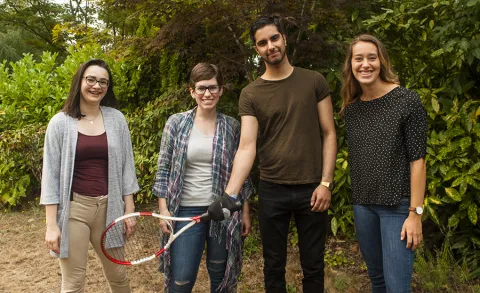Engineering students place second in design challenge

On October 3, Universities Canada announced the winners of this year’s Innovative Design for Accessibility (IDeA) challenge, which includes a group of UBC engineering students who developed a grip assistive device for quadriplegic athletes. As part of the UBC Engineers in Scrubs (EiS) program, the team: Carly Jones; Jeanie Malone; Taylor Molde and Avineet Randhawa (all master's students in the UBC School of Biomedical Engineering), has developed a grip assistive device targeted at quadriplegic tennis players. Partnering with the Rick Hansen Institute (RHI) — a not-for-profit organization focused on spinal cord injury research and care — the team produced a customizable “molded prototype” that combines hard plastic and softer fabric pieces to ensure a secure and repeatable grip while minimizing pressure and maximizing comfort.
Potential Impact?
Wheelchair tennis is one of the fastest growing sports in the world, and this device has the potential to encourage and increase participation among people with limited hand function.
According to the RHI consumer group, the vast majority of professional-level wheelchair tennis athletes adopt the sport after their spinal cord injury, so the potential for adoption is high.
Key Statistics
Quadriplegia resulting from spinal cord injury is the most common condition throughout the quad wheelchair tennis division. There are over 30,000 quadriplegics in Canada.
Nearly 3.5% of Canadians report dexterity-related disabilities - that is approximately 1 million Canadians.
There are over 120 elite level quad-division tennis players on the International Tennis Federation’s listing, three of whom are Canadian, and there are approximately 1,000 competitive and recreational players in Canada.
Rob Shaw, a member of the team’s consumer engagement group and a world-ranked quadriplegic tennis athlete, commented on the project:
"The potential impact of this project goes far beyond the practical objective of increasing participation in tennis and other racket sports for people with impaired hand function.
Increasing recreational participation for people with disabilities has a positive, cascading effect on self-efficacy, self-worth, socialization, independence, and quality of life. The ability to engage with your friends, family, colleagues, and children in a recreational capacity is something many individuals with impaired hand function are not able to do.
Of course the grip aid will allow international athletes like myself to compete and train at the highest possible level but truthfully, what excites me even more, is the impact this grip aid will have in helping to reduce barriers that prevent people from experiencing the benefits of having a healthy active lifestyle.”
IDeA is a national competition that motivates university students to develop innovative, practical and cost-effective solutions to accessibility barriers for people with disabilities. Students take an inclusive design approach to create solutions that make our communities more accessible. Collaborating with industry, government, and community partners, students develop valuable skills placing them in a position to excel in a prosperous, inclusive and innovative Canadian economy.
The Innovative Design for Accessibility (IDeA) student competition aims to inspire students to use their creativity to develop innovative, cost-effective and practical solutions to accessibility-related issues resulting in communities that are more accessible for persons with disabilities.
“Congratulations to the winners of the 2018 IDeA Program competition, and to all the students who participated. Our Government is proud to support Universities Canada in this meaningful initiative. It is a great opportunity for students to be creative and practice their academic skills, and it shows how working together with people with disabilities can lead to a change in the way Canadians think about accessibility. Addressing physical, systemic, and attitudinal barriers is important as we move toward a truly accessible Canada” says the Honourable Carla Qualtrough, Minister of Public Services and Procurement and Accessibility.
Official Universities Canada media release.